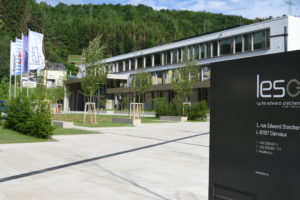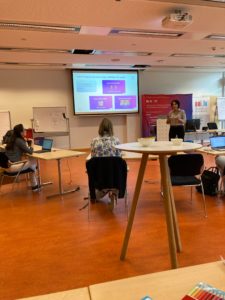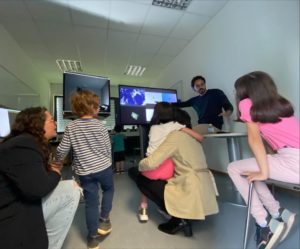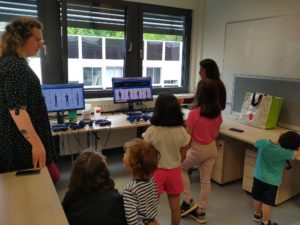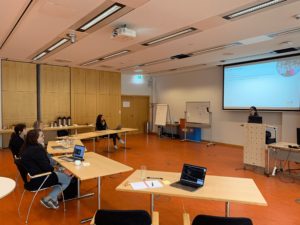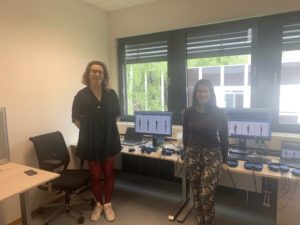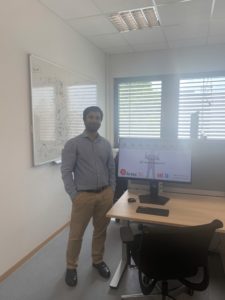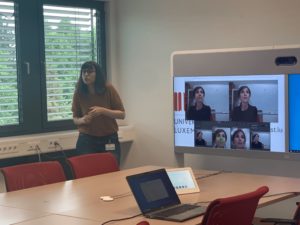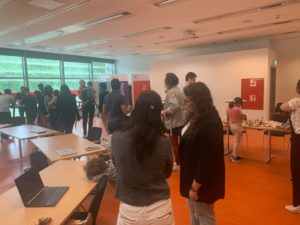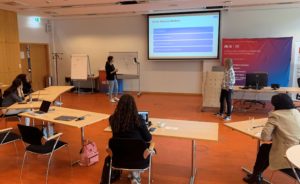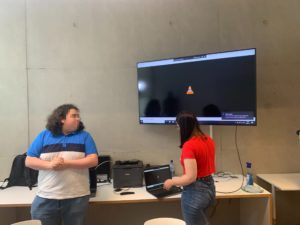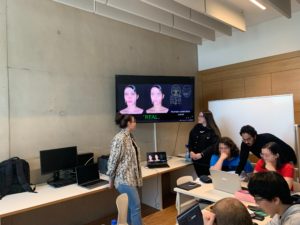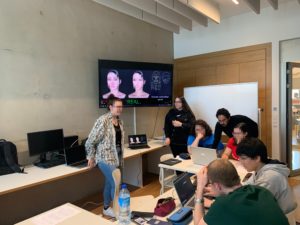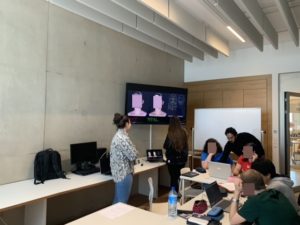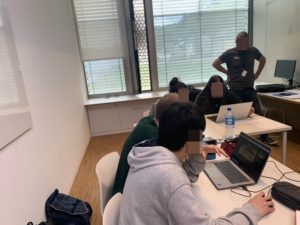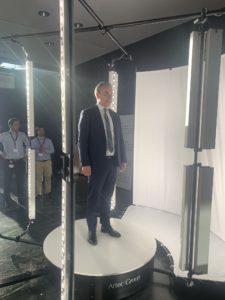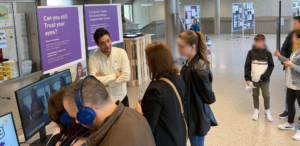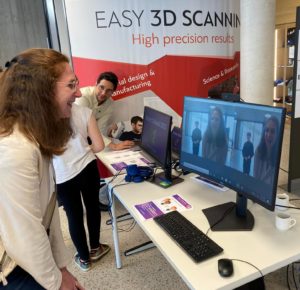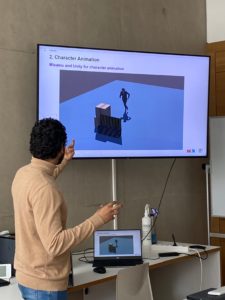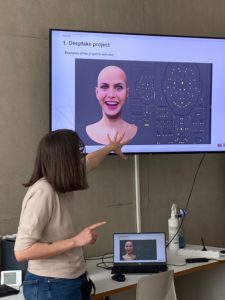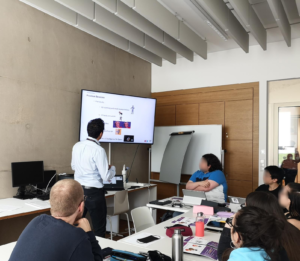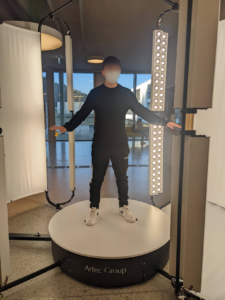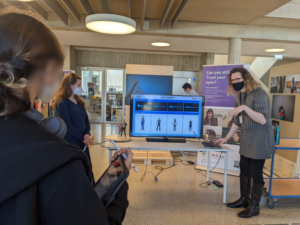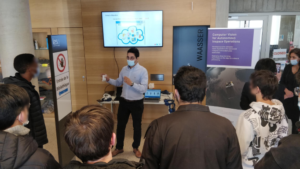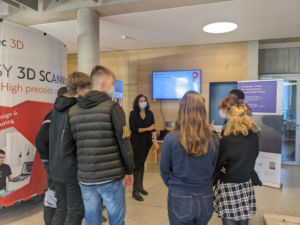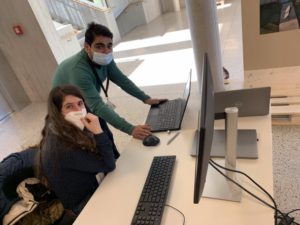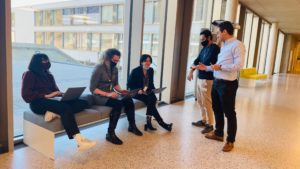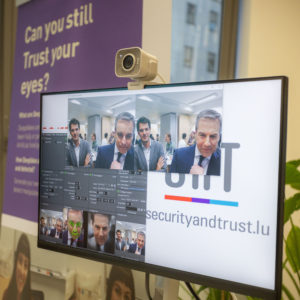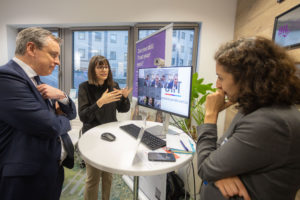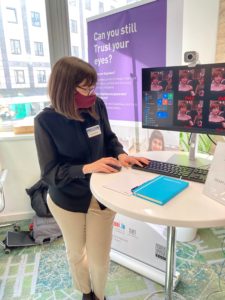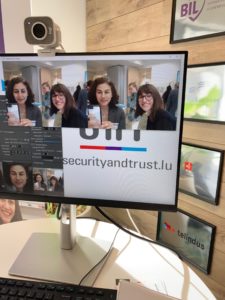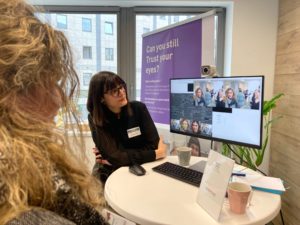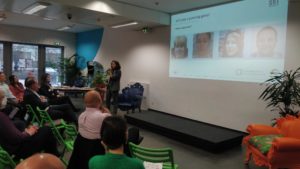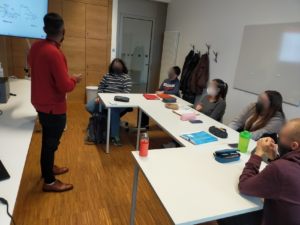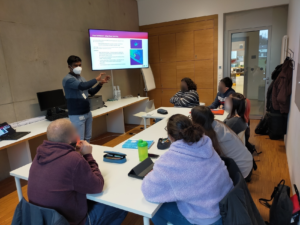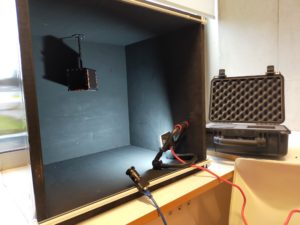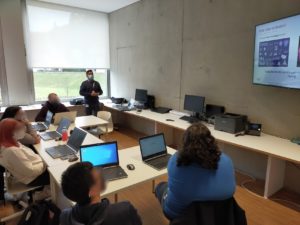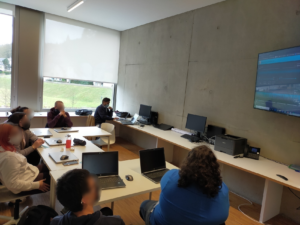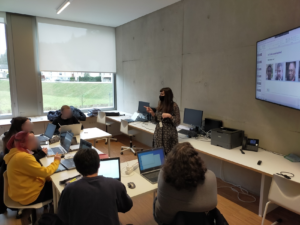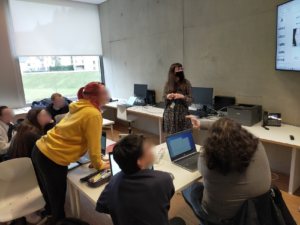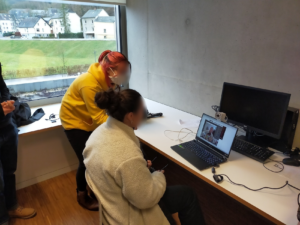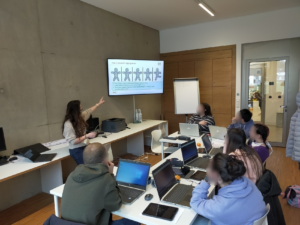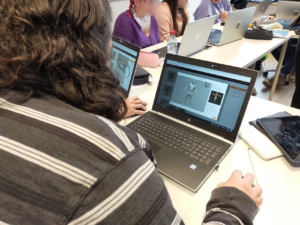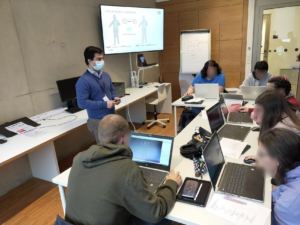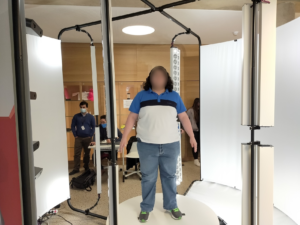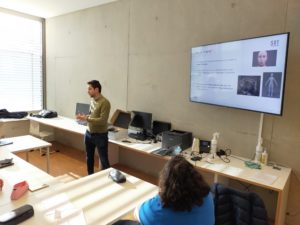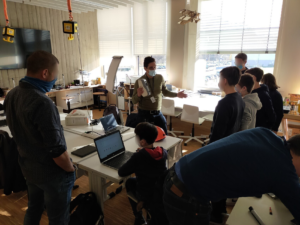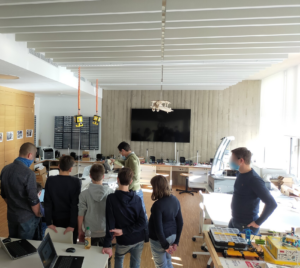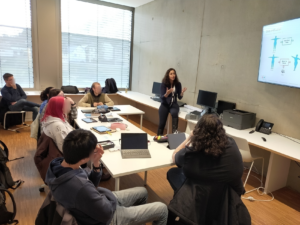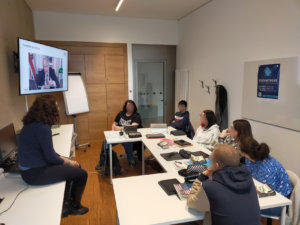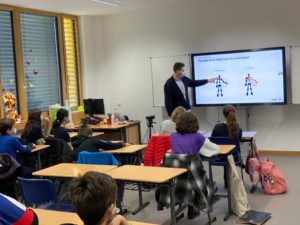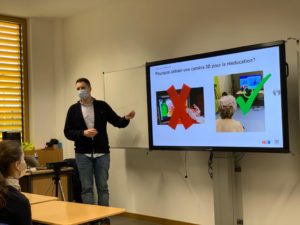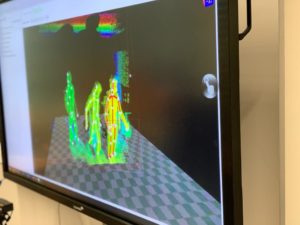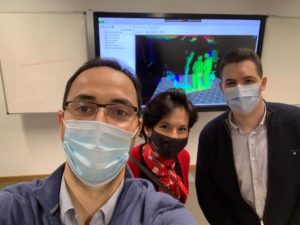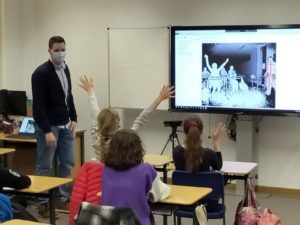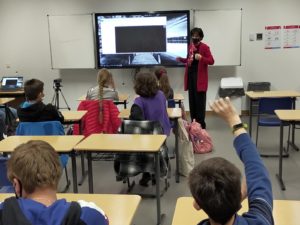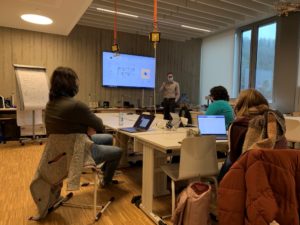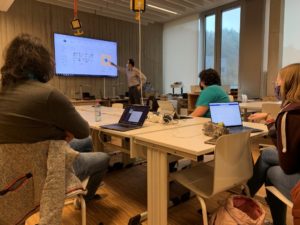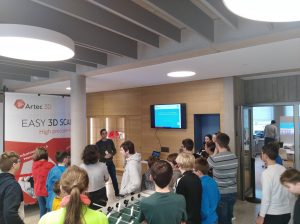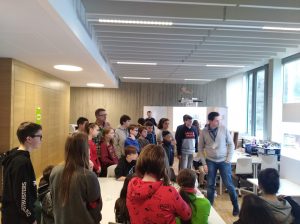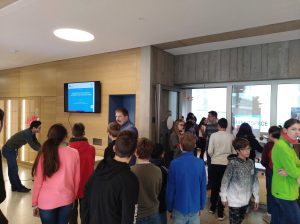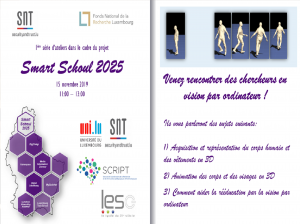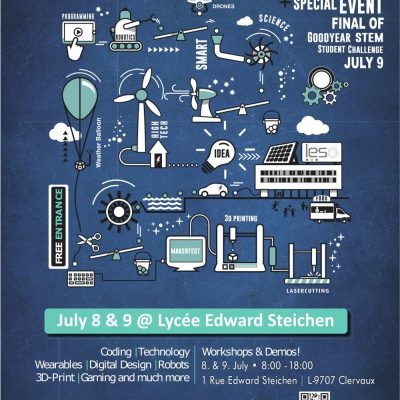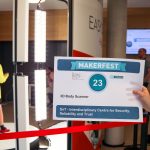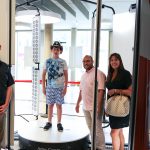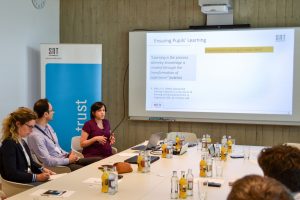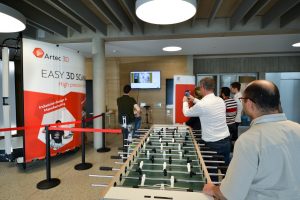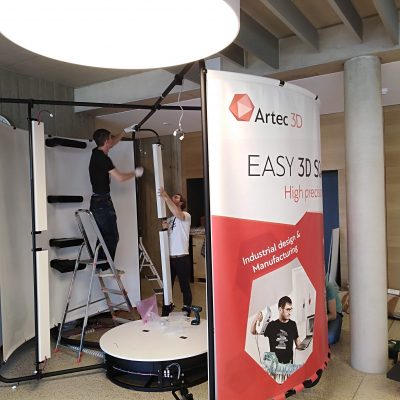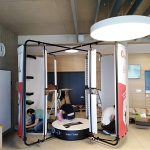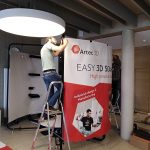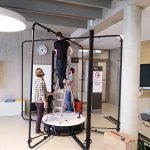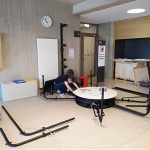7 June 2022
News
Last steering committee held remotely
The last steering committee meeting was held on June 7th 2022. The progress of the project as well as follow-up actions were discussed.
Workshop on AI and Education at SnT
23 May 2022
Researchers from Computer Vision, Imaging and Machine Intelligence (CVI2) at the Interdisciplinary centre of Security, reliability and Trust (SnT), University of Luxembourg have organized a Workshop to present and discuss experiences from different initiatives involving AI and Education. Representatives from Scienteens, Luxembourg Tech School and FNR have participated to the event.
Entreprise mini-projects at LESC: last session
17 May 2022
During the last session of the Entreprise mini-projects, the students presented the creative videos that they have prepared using Artificial Intelligence and Computer Vision tools. The winners have been elected and have been awarded Airpods.
Researchers from CVI2 at the DLH launch event
16 May 2022
Researchers from Computer Vision, Imaging and Machine Intelligence (CVI2) at the Interdisciplinary centre of Security, reliability and Trust (SnT), University of Luxembourg demonstrated their work at the Digital Hub Learning (DLH) launch event.
Researchers from CVI2 at LESC's open day event
23 April 2022
Researchers from Computer Vision, Imaging and Machine Intelligence (CVI2) at the Interdisciplinary centre of Security, reliability and Trust (SnT), University of Luxembourg demonstrated their work at LESC’s open day.
Entreprise mini-projects at LESC
19 April 2022 – 17 May 2022
Researchers from Computer Vision, Imaging and Machine Intelligence (CVI2) at the Interdisciplinary centre of Security, reliability and Trust (SnT), University of Luxembourg are organizing mini-projects for LESC students. The projects aim at giving hands-on experience to the students. Through the projects, the students will use recent Artificial Intelligence and Computer Vision tools and will put in place a creative video. These mini-projects were integrated as part of the optional Entreprise course. Each group of 2 students will work on one of the following topics: deepfakes, 3D body scan animation, 3D space environment simulation.
Workshop at LESC: Art & Computer Vision
4 Mar 2022
Researchers from the Computer Vision, Imaging and Machine Intelligence (CVI2) team at the Interdisciplinary Centre for Security, Reliability and Trust (SnT), University of Luxembourg, ran an interactive workshop on how to produce and interpret music with Artificial Intelligence (AI) and Computer Vision tools. Students could manipulate two demos, namely:
– Hear your body, which generates a unique melody from a 3D body scan.
– Let’s dance, which animates a 3D body scan with a coherent dance given a chosen song.
They had also the opportunity to discuss with researchers and propose possible improvements.
Deepfake demonstration at the Education Technology event
2 Mar 2022
Researchers from the Computer Vision, Imaging and Machine Intelligence (CVI2) research group of the Interdisciplinary centre of Security, reliability and Trust (SnT), University of Luxembourg, attended the Education Technology event organized by the SCRIPT Department of the Ministry of Education, Children & Youth and the House of Startups, in the presence of the Minister of Education, Claude Meisch. They demonstrated one of the workshops that were presented to students in LESC, namely, deepfake generation and detection.
Entreprise workshops at LESC: space simulator
4 Jan 2022
The last workshop of the Entreprise course held in LESC focused on the topic of pose estimation. Dr. Arunkumar Rathinam and Dr. Leo Pauly, Research Associates at the Computer Vision, Imaging and Machine Intelligence (CVI2) research group of the Interdisciplinary centre of Security, reliability and Trust (SnT), University of Luxembourg, presented the current state of space exploration and future directions. Then, they explained the different stages of the pose estimation process, namely, satellite detection, 2D-3D correspondence, and pose calculation. Video demonstrations and live interactive tools were also presented.
Entreprise workshops at LESC: data sonification
3 Jan 2022
During the 6th workshop of the Entreprise course held in LESC, Inder Pal Singh, PhD student from the Computer Vision, Imaging and Machine Intelligence (CVI2) at the Interdisciplinary centre of Security, reliability and Trust (SnT), University of Luxembourg introduced the field of data sonification and presented examples of real-world applications. Data sonification consists in generating meaningful sounds from data with the goal of facilitating their interpretation. The students used the online tool TwoTone to generate music from previously acquired 3D scans (body or object).
Entreprise workshops at LESC: deepfake generation and detection
14 Dec 2021
The 5th workshop of the Entreprise course held in LESC was dedicated to the topic of deepfake generation and detection. Nesryne Mejri, PhD student at the Computer Vision, Imaging and Machine Intelligence (CVI2) research group of the Interdisciplinary centre of Security, reliability and Trust (SnT), University of Luxembourg presented an overview of existing techniques. She has demonstrated Realistic deepfakes and provided tricks for recognizing deepfakes with naked eyes. At the end of the session, the students have generated their own deepfake using the DeepFaceLive app. They have swapped their faces with celebrities’ faces such as Tom Cruise and Silvester Stalone.
Entreprise workshops at LESC: 3D body scan animation
7 Dec 2021
For the 4th workshop of the Entreprise course held at LESC, Dr. Laura Lopez Fuentes, Research Associate at the Computer Vision, Imaging and Machine Intelligence (CVI2) research group of the Interdisciplinary centre of Security, reliability and Trust (SnT), University of Luxembourg has introduced basic concepts and tools for animating a 3D body model with a predefined movement or dance. At the end of the session, the students have used the online tool Mixamo for animating the acquired body scans.
Entreprise workshops at LESC: booth scanning
29-30 Nov 2021
The third workshop in the context of the Entreprise course held on November 29th and 30th, 2021 was dedicated to the introduction of 3D human body modelling concepts. Dr. Ali Sk Aziz and Dr. Anis Kacem, both Research Associates at the Computer Vision, Imaging and Machine Intelligence (CVI2) research group of the Interdisciplinary centre of Security, reliability and Trust (SnT), University of Luxembourg have scanned the 3D human body of the students using the booth. They have presented concepts related to the numerical analysis of 3D data such as meshes, texture, etc. Students had the opportunity to manipulate their own 3D scan using the software Meshlab. Meshlab is an open-source system for processing and editing 3D triangular meshes.
Entreprise workshops at LESC: scanning 3D objects
23 Nov 2021
The second workshop in the context of the Entreprise course organized at LESC has been held on November 23rd, 2021. Dr. Anis Kacem, Research Associate at the Computer Vision, Imaging and Machine Intelligence (CVI2) research group of the Interdisciplinary centre of Security, reliability and Trust (SnT), University of Luxembourg has presented 3D imaging sensors that are used to scan objects. He has explained the different acquisition techniques. Finally, the students have scanned objects using the ARTEC Broadway scanner. The latter is a hand-held scanner often used to acquire 3D scans of objects.
Entreprise workshops at LESC: introduction to Computer Vision and Artificial Intelligence
22 Nov 2021
Researchers from Computer Vision, Imaging and Machine Intelligence (CVI2) at the Interdisciplinary centre of Security, reliability and Trust (SnT), University of Luxembourg have organized 7 interactive workshops on the recent trends in Artificial Intelligence and Computer Vision at LESC. These workshops were integrated as part of the optional Entreprise course. The first workshop held on November 22nd, 2021 was an introductory session aiming to present the structure of the course. Basic concepts from computer vision and artificial intelligence were reviewed and discussed with the students. Then, real-world applications were presented and related to the proposed workshops.
Workshop on computer vision tools for rehabilitation at the private school of Notre-dame Sainte-Sophie
Researchers from Computer Vision, Imaging and Machine Intelligence (CVI2) at the Interdisciplinary centre of Security, reliability and Trust (SnT), University of Luxembourg have organized a workshop on computer vision tools for rehabilitation at the private school of Notre-Dame Sainte-Sophie.
Advisory board held in hybrid mode.
8 Feb 2021
In the middle of forced home schooling, representatives from SCRIPT, LESC and SnT met to discuss new ways to adapt the deployment of Smart Schoul 2025 under the new reality of life in COVID times. The Smart Schoul 2025 platform will be used as a tool for remote access to AI within the class curriculum.
Exchanges around AI between SnT researchers and students at LESC
11 Dec 2020
Computer Vision researchers from the Computer Vision, Imaging and Machine Intelligence (CVI2) team at the Interdisciplinary Centre for Security, Reliability and Trust (SnT), University of Luxembourg, ran an interactive workshop on recent tools in Artificial Intelligence (AI). This workshop was integrated as part of the “Technologies and Innovation” course. Students could exchange with researchers first-hand and learn the basics and principles of AI directly from the experts.
COVID-19 outbreak
20 Sept 2020
Since March 2020, just like for all schools in the country, LESC has started working in remote mode dealing with an exceptional global emergency situation. and operating in hybrid mode since end of May 2020. During this period, almost all extracurricular activities were suspended, including the Smart Schoul 2025 project. In the fall of 2020, exchanges between teachers and researchers have restarted intermittently and one Advisory Board meeting has taken place.
First computer vision workshop at LESC
10 Nov 2019
In the context of the SmartSchoul 2025 project, the Lycée Edward Steichen in Clervaux (LESC) has hosted the first computer vision workshop on the 15th November. As part of the project, the computer vision researchers presented their work to multiple groups of students from the 7e GS2 and the 7e GS3 classes. Three different topics have been presented, namely:
- Acquisition and representation of the human body in 3D.
- Animation of 3D bodies and faces.
- Rehabilitation using computer vision.
In addition, the researchers have conducted some onsite demos followed by face-to-face discussion with the student. The goal is to trigger the curiosity of the students and boost their motivation towards new technologies.
MakerFest 8–9 July 2019
5 July 2019
In the context of the SmartSchoul 2025, the computer vision team from SnT will participate in the MakerFest event on the 8th – 9th of July, which will be hosted by The Lycée Edward Steichen in Clervaux (LESC). As part of the project, the 3D body scanner “Shapify” has been already installed at LESC. The scanner will be available for the students during the MakerFest event. The students will be able to use the scanner and further explore the obtained 3D body models. This will further trigger their curiosity and boost their motivations towards new technologies.
Kickoff Meeting “Smart Schoul 2025” Project
4 July 2019
Over the next three years, the Computer Vision, Imaging and Machine Intelligence Research group (CVI2) from the University’s Interdisciplinary Centre for Security, Reliability and Trust (SnT) will embed cutting-edge computer vision technologies throughout the Lycee Edward Steichen at Clervaux (LESC), giving students a real look into how modern data science and computer technologies enrich our world.
Computer vision covers the ways in which computers can be used to process images and video to gain greater insights into the world around us. The field is an ideal example of computer science and engineering – subjects that can be rather intimidating to school students, it is intuitively understandable, almost immediately perceivable, and it can play a part in many aspects of daily life.
Our goal is to help shape tomorrow’s digital citizens. And that means not just encouraging students to use consumer technologies — today’s young students already know their way around an iPad. Rather, these “digital citizens” will learn how to use technology creatively, as independent and responsible agents.
Thanks to funding provided by the Luxembourg National Research Fund (FNR) Promoting Science to the Public (PSP) Flagship Grant, as well a close advisory partnership with the Luxembourg Ministry of Education, Children and Youth, Smart Schoul 2025 aims to put Luxembourg on the frontlines of adapting public education to the needs of an increasingly tech-driven society.
With help from their industry research partner Artec 3D, market leader in 3D scanning technologies and headquartered in Luxembourg, the SnT computer vision team has already installed a 3D body scanner (the “Artec Shapify Booth”) at the LESC entrance. Students can use the scanning booth to get their 3D body scan data for any project they can imagine — whether for art, biology, maths or engineering.
It is also important that students learn the ethics of working with private data. Having access to this technology will give them the opportunity to really understand what private data really is, where it comes from, and how to use it responsibly.
We installed our 3D booth!
2 July 2019
As part of the “Smart Schoul 2025” project, the computer vision team at SnT has installed, with the support of Artec 3D, the full body 3D scanner booth “Shapify” at LESC. The scanning process will provide the students with access to their 3D body models which will be further used in different activities, board games, data processing, data annotation, and 3D body animations. These activities will be further monitored by researchers from the computer vision team with direct support from the teacher at LESC. The “Shapify” booth will be also part of the “MakerFest” event at LESC, which will take place on the 8th – 9th of July 2019.

